Hi everyone, Dr. Almas here. Today, we’re going to delve into a topic that might surprise you: the health risks of sitting. Yes, sitting! It’s become such a ubiquitous part of our lives, we often underestimate its impact. But research paints a clear picture – excessive sitting poses a significant threat to our health, much like smoking.
Before we discus things further, I would like to talk about what happened at The Office Olympics: “In the land of cubicles and fluorescent lights, a fierce competition was brewing—the Office Olympics! The first event? The Sit-a-thon. Employees squared off, armed with ergonomic chairs and ergonomic pillows, determined to out-sit each other. But as the hours ticked by, they realized they were all losers in the game of health. So, they traded their chairs for standing desks and declared the next event: the Stand-a-thon! Remember, folks, sitting may be the new smoking, but standing is the new gold medal.”
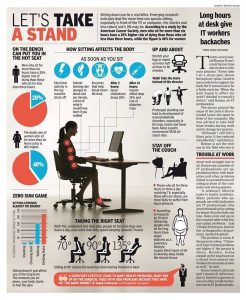
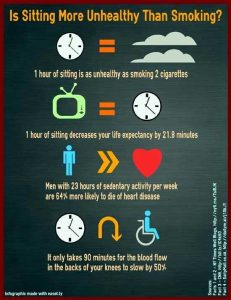
So coming back to our topic,
* How Sedentary Are We?
Let’s face it, our modern world practically encourages a sedentary lifestyle. We work at desks, commute by car, unwind on the couch – studies suggest the average person sits for a whopping 8-10 hours a day! This lack of movement wreaks havoc on our bodies, designed for activity.
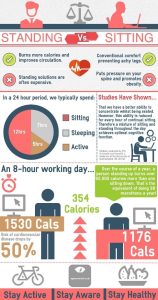
Complications of Excessive Sitting
The problem goes beyond a stiff back. Here’s how prolonged sitting can harm your health:
- Metabolic Disruption: Sitting disrupts how your body processes fats and sugars. Blood flow slows down, muscles become inactive, and harmful fats begin to accumulate in your bloodstream. This paves the way for:
- Heart Disease: Stiffened arteries and increased blood clot risk significantly raise your chances of a heart attack or stroke.
- Type 2 Diabetes: Sitting impairs your body’s ability to regulate blood sugar, leading to insulin resistance and potentially diabetes.
- Certain Cancers: Studies show a link between prolonged sitting and an increased risk of colon, endometrial, and lung cancers.
- Other Concerns: Sitting can also contribute to:
- Obesity: Reduced calorie burning and increased snacking due to boredom can lead to weight gain.
- Musculoskeletal Issues: Back pain, tight hips, and poor posture are common consequences of excessive sitting.
- Mental Health: Studies suggest a link between prolonged sitting and an increased risk of depression and anxiety
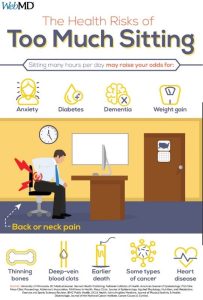
Breaking the Sitting Habit: Practical Tips
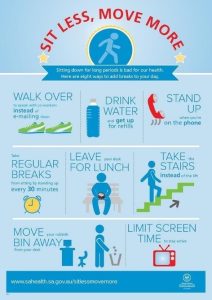
The good news: unlike smoking, sitting is a behavior we can modify. Here are some actionable tips to get you moving:
- Embrace the Standing Desk: Consider using a standing desk at work, or improvise with a high counter or elevated surface.
- The Power of Breaks: Set timers to remind yourself to get up and move every 30 minutes. Walk around, stretch, do some jumping jacks – anything to get your blood flowing.
- Active Commuting: Ditch the car or bus whenever possible. Walk, bike, or use public transport that involves some walking. Every bit counts!
- Active Leisure: Swap your usual Netflix session for a walk, a yoga routine, or a fun sport. Make fitness enjoyable!
- Small Changes, Big Impact: Park further away, take the stairs instead of the elevator, do some chores during commercial breaks. Every movement matters.
Hacking Your Sitting:
Here are some clever ways to integrate movement into your day:
- Invest in an exercise ball: Swap your office chair for an exercise ball for improved core strength and posture.
- Deskercise: Find short, desk-friendly exercises like leg lifts, arm stretches, or seated squats to keep your blood flowing during work.
- Walking Meetings: Ditch the conference room and have walking meetings to brainstorm on the go.
- Standing Desks at Home: Consider a standing desk converter for your home workspace to maintain good posture while working remotely.
- Make Use of Technology: Utilize fitness trackers that remind you to move or apps with quick exercise routines.
Remember: Consistency is Key!
These changes might seem small, but their cumulative effect is significant. Aim for at least 30 minutes of moderate-intensity exercise most days of the week, and break up prolonged sitting throughout the day.
Conclusion: Stand Up For Your Health!
Sitting may not be as immediately dangerous as smoking, but its long-term effects are undeniable. By incorporating these tips and hacks, you can significantly reduce your risk of chronic diseases and live a healthier, more active life. Don’t let sitting become your new vice. Stand up for your health – your body will thank you for it!
Additionally:
- If you have pre-existing health conditions, consult your doctor before starting any new exercise program.
- Consider ergonomic assessments for your workspace to optimize your sitting posture and minimize strain.
- Remember, small changes are sustainable changes. Start slow, build a habit, and gradually increase your activity level.
Together, let’s make sitting the new “out” and prioritize a healthy, active lifestyle.








